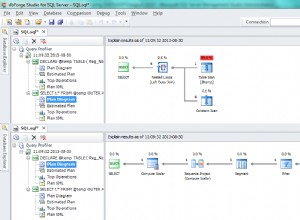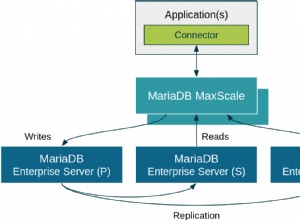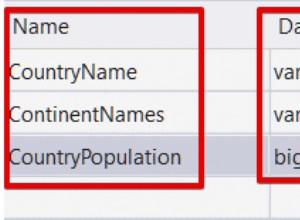EDIT :untuk mencegah kondisi balapan
di lingkungan bersamaan, gunakan WITH (UPDLOCK) di subquery yang berkorelasi atau EXCEPT 'd SELECT . Skrip pengujian yang saya tulis di bawah ini tidak memerlukannya, karena menggunakan tabel sementara yang hanya dapat dilihat oleh koneksi saat ini, tetapi dalam lingkungan nyata, yang beroperasi terhadap tabel pengguna, itu akan diperlukan.
MERGE tidak memerlukan UPDLOCK .
Terinspirasi oleh jawaban mcl re:indeks unik &biarkan database membuat kesalahan, saya memutuskan untuk membandingkan sisipan bersyarat vs. coba/tangkap .
Hasilnya tampaknya mendukung penyisipan bersyarat melalui coba/tangkap, tetapi YMMV. Ini adalah skenario yang sangat sederhana (satu kolom, tabel kecil, dll), dieksekusi pada satu mesin, dll.
Berikut adalah hasilnya (SQL Server 2008, build 10.0.1600.2):
duplicates (short table)
try/catch: 14440 milliseconds / 100000 inserts
conditional insert: 2983 milliseconds / 100000 inserts
except: 2966 milliseconds / 100000 inserts
merge: 2983 milliseconds / 100000 inserts
uniques
try/catch: 3920 milliseconds / 100000 inserts
conditional insert: 3860 milliseconds / 100000 inserts
except: 3873 milliseconds / 100000 inserts
merge: 3890 milliseconds / 100000 inserts
straight insert: 3173 milliseconds / 100000 inserts
duplicates (tall table)
try/catch: 14436 milliseconds / 100000 inserts
conditional insert: 3063 milliseconds / 100000 inserts
except: 3063 milliseconds / 100000 inserts
merge: 3030 milliseconds / 100000 inserts
Perhatikan, bahkan pada sisipan unik, ada sedikit lebih banyak overhead untuk dicoba/tangkap daripada penyisipan bersyarat. Saya ingin tahu apakah ini bervariasi menurut versi, CPU, jumlah inti, dll.
Saya tidak membandingkan IF sisipan bersyarat, cukup WHERE . Saya berasumsi IF variasi akan menunjukkan lebih banyak overhead, karena a) apakah Anda akan memiliki dua pernyataan, dan b) Anda perlu membungkus dua pernyataan dalam suatu transaksi dan mengatur tingkat isolasi ke serializable (!). Jika seseorang ingin untuk menguji ini, Anda perlu mengubah tabel temp menjadi tabel pengguna biasa (serializable tidak berlaku untuk tabel temp lokal).
Berikut scriptnya:
-- tested on SQL 2008.
-- to run on SQL 2005, comment out the statements using MERGE
set nocount on
if object_id('tempdb..#temp') is not null drop table #temp
create table #temp (col1 int primary key)
go
-------------------------------------------------------
-- duplicate insert test against a table w/ 1 record
-------------------------------------------------------
insert #temp values (1)
go
declare @x int, @y int, @now datetime, @duration int
select @x = 1, @y = 0, @now = getdate()
while @y < 100000 begin
set @y = @y+1
begin try
insert #temp select @x
end try
begin catch end catch
end
set @duration = datediff(ms,@now,getdate())
raiserror('duplicates (short table), try/catch: %i milliseconds / %i inserts',-1,-1,@duration,@y) with nowait
go
declare @x int, @y int, @now datetime, @duration int
select @x = 1, @y = 0, @now = getdate()
while @y < 100000 begin
set @y = @y+1
insert #temp select @x where not exists (select * from #temp where col1 = @x)
end
set @duration = datediff(ms,@now,getdate())
raiserror('duplicates (short table), conditional insert: %i milliseconds / %i inserts',-1,-1,@duration, @y) with nowait
go
declare @x int, @y int, @now datetime, @duration int
select @x = 1, @y = 0, @now = getdate()
while @y < 100000 begin
set @y = @y+1
insert #temp select @x except select col1 from #temp
end
set @duration = datediff(ms,@now,getdate())
raiserror('duplicates (short table), except: %i milliseconds / %i inserts',-1,-1,@duration, @y) with nowait
go
-- comment this batch out for SQL 2005
declare @x int, @y int, @now datetime, @duration int
select @x = 1, @y = 0, @now = getdate()
while @y < 100000 begin
set @y = @y+1
merge #temp t using (select @x) s (col1) on t.col1 = s.col1 when not matched by target then insert values (col1);
end
set @duration = datediff(ms,@now,getdate())
raiserror('duplicates (short table), merge: %i milliseconds / %i inserts',-1,-1,@duration, @y) with nowait
go
-------------------------------------------------------
-- unique insert test against an initially empty table
-------------------------------------------------------
truncate table #temp
declare @x int, @now datetime, @duration int
select @x = 0, @now = getdate()
while @x < 100000 begin
set @x = @x+1
insert #temp select @x
end
set @duration = datediff(ms,@now,getdate())
raiserror('uniques, straight insert: %i milliseconds / %i inserts',-1,-1,@duration, @x) with nowait
go
truncate table #temp
declare @x int, @now datetime, @duration int
select @x = 0, @now = getdate()
while @x < 100000 begin
set @x = @x+1
begin try
insert #temp select @x
end try
begin catch end catch
end
set @duration = datediff(ms,@now,getdate())
raiserror('uniques, try/catch: %i milliseconds / %i inserts',-1,-1,@duration, @x) with nowait
go
truncate table #temp
declare @x int, @now datetime, @duration int
select @x = 0, @now = getdate()
while @x < 100000 begin
set @x = @x+1
insert #temp select @x where not exists (select * from #temp where col1 = @x)
end
set @duration = datediff(ms,@now,getdate())
raiserror('uniques, conditional insert: %i milliseconds / %i inserts',-1,-1,@duration, @x) with nowait
go
truncate table #temp
declare @x int, @now datetime, @duration int
select @x = 0, @now = getdate()
while @x < 100000 begin
set @x = @x+1
insert #temp select @x except select col1 from #temp
end
set @duration = datediff(ms,@now,getdate())
raiserror('uniques, except: %i milliseconds / %i inserts',-1,-1,@duration, @x) with nowait
go
-- comment this batch out for SQL 2005
truncate table #temp
declare @x int, @now datetime, @duration int
select @x = 1, @now = getdate()
while @x < 100000 begin
set @x = @x+1
merge #temp t using (select @x) s (col1) on t.col1 = s.col1 when not matched by target then insert values (col1);
end
set @duration = datediff(ms,@now,getdate())
raiserror('uniques, merge: %i milliseconds / %i inserts',-1,-1,@duration, @x) with nowait
go
-------------------------------------------------------
-- duplicate insert test against a table w/ 100000 records
-------------------------------------------------------
declare @x int, @y int, @now datetime, @duration int
select @x = 1, @y = 0, @now = getdate()
while @y < 100000 begin
set @y = @y+1
begin try
insert #temp select @x
end try
begin catch end catch
end
set @duration = datediff(ms,@now,getdate())
raiserror('duplicates (tall table), try/catch: %i milliseconds / %i inserts',-1,-1,@duration,@y) with nowait
go
declare @x int, @y int, @now datetime, @duration int
select @x = 1, @y = 0, @now = getdate()
while @y < 100000 begin
set @y = @y+1
insert #temp select @x where not exists (select * from #temp where col1 = @x)
end
set @duration = datediff(ms,@now,getdate())
raiserror('duplicates (tall table), conditional insert: %i milliseconds / %i inserts',-1,-1,@duration, @y) with nowait
go
declare @x int, @y int, @now datetime, @duration int
select @x = 1, @y = 0, @now = getdate()
while @y < 100000 begin
set @y = @y+1
insert #temp select @x except select col1 from #temp
end
set @duration = datediff(ms,@now,getdate())
raiserror('duplicates (tall table), except: %i milliseconds / %i inserts',-1,-1,@duration, @y) with nowait
go
-- comment this batch out for SQL 2005
declare @x int, @y int, @now datetime, @duration int
select @x = 1, @y = 0, @now = getdate()
while @y < 100000 begin
set @y = @y+1
merge #temp t using (select @x) s (col1) on t.col1 = s.col1 when not matched by target then insert values (col1);
end
set @duration = datediff(ms,@now,getdate())
raiserror('duplicates (tall table), merge: %i milliseconds / %i inserts',-1,-1,@duration, @y) with nowait
go




